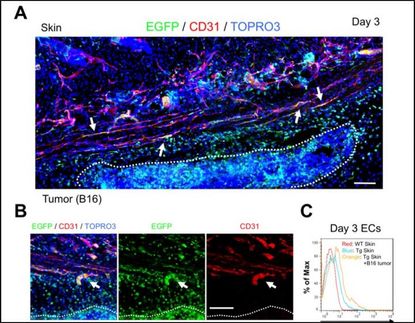Regeneron And Aventis Begin Study Of Intravenous VEGF Trap In Cancer
Tarrytown, New York - Regeneron Pharmaceuticals, Inc. announced the initiation of a Phase I Clinical Trial in cancer to assess the safety and tolerability of intravenous VEGF Trap. The study is being conducted in collaboration with Aventis, Regeneron's partner in the development of the VEGF Trap in oncology and eye disorders.
"The FDA's recent approval of the first angiogenesis inhibitor to treat cancer not only validates the approach but also encourages the development of other anti-angiogenesis agents, such as the VEGF Trap, that may be more effective," noted Leonard S. Schleifer, M.D., Ph. D., President and Chief Executive Officer of Regeneron. "Our preclinical research shows that the VEGF Trap is, perhaps, the most potent blocker of VEGF described and may play a role in treating an array of diseases, including cancer, in which the growth of new blood vessels is an important contributor to the disease process."
George D. Yancopoulos, M.D., Ph. D., Executive Vice President and Chief Scientific Officer of Regeneron, added: "This new trial is exciting because it will examine higher doses of the VEGF Trap than have previously been evaluated. This study will help determine the optimal dose of the VEGF Trap that we can move into both single-agent trials and clinical trials of the VEGF Trap in combination with commonly used chemotherapy regimens in a variety of different cancer indications."
The initial Phase I Clinical Trial of the VEGF Trap is nearing completion. In this study, the VEGF Trap was administered subcutaneously to patients with solid tumors or non-Hodgkin's lymphoma. The primary objectives of the study were to determine the safety, tolerability and preliminary anti-tumor activity of the VEGF Trap. The maximum dose in this study was limited to 1.6 mg/kg per week, and there have been no indications to date that a maximum tolerated dose would be reached among the doses tested in the trial. Results from this study will be presented at the American Society of Clinical Oncology (ASCO) annual meeting in June 2004.
Rapid attainment of higher plasma VEGF Trap levels than could be achieved with subcutaneous administration will be a goal of the new study, which will evaluate increasing dose levels of the VEGF Trap delivered intravenously to patients with advanced solid tumors or non-Hodgkin's lymphoma. As in the initial Phase I Trial, the primary endpoints of the new study will be to evaluate the safety and tolerability of higher doses of the VEGF Trap and to determine the pharmacokinetics of the molecule delivered intravenously.
The Role of VEGF in the Tumor Growth
Vascular Endothelial Growth Factor (VEGF) is a naturally occurring protein in the body whose normal role is to trigger formation of new blood vessels (angiogenesis) to support the growth of the body's tissues and organs, but it has also been associated with the abnormal growth of new blood vessels surrounding tumors to support their expansion. Blocking tumor-associated angiogenesis has been shown to prevent tumor growth in a variety of preclinical models, with the most widely recognized and highly validated results achieved based on approaches that block VEGF. The VEGF Trap has been shown in preclinical studies to block the action of VEGF, thereby blocking the abnormal growth of blood vessels, and a VEGF antibody has demonstrated efficacy in advanced clinical programs. In a number of publications, Regeneron has reported a breakthrough in understanding how receptors work for an entire class of growth factors and cytokines in the human body. Based on these findings, Regeneron developed the VEGF Trap, a blocker of the growth factor VEGF.
Other news from the department business & finance

Get the life science industry in your inbox
By submitting this form you agree that LUMITOS AG will send you the newsletter(s) selected above by email. Your data will not be passed on to third parties. Your data will be stored and processed in accordance with our data protection regulations. LUMITOS may contact you by email for the purpose of advertising or market and opinion surveys. You can revoke your consent at any time without giving reasons to LUMITOS AG, Ernst-Augustin-Str. 2, 12489 Berlin, Germany or by e-mail at revoke@lumitos.com with effect for the future. In addition, each email contains a link to unsubscribe from the corresponding newsletter.
























































